Artnet News Pro
The Creators of Bored Ape Yacht Club Want to Become the Amazon of the NFT Space. Can They Pull It Off?
After a major acquisition, all eyes are on the BAYC.
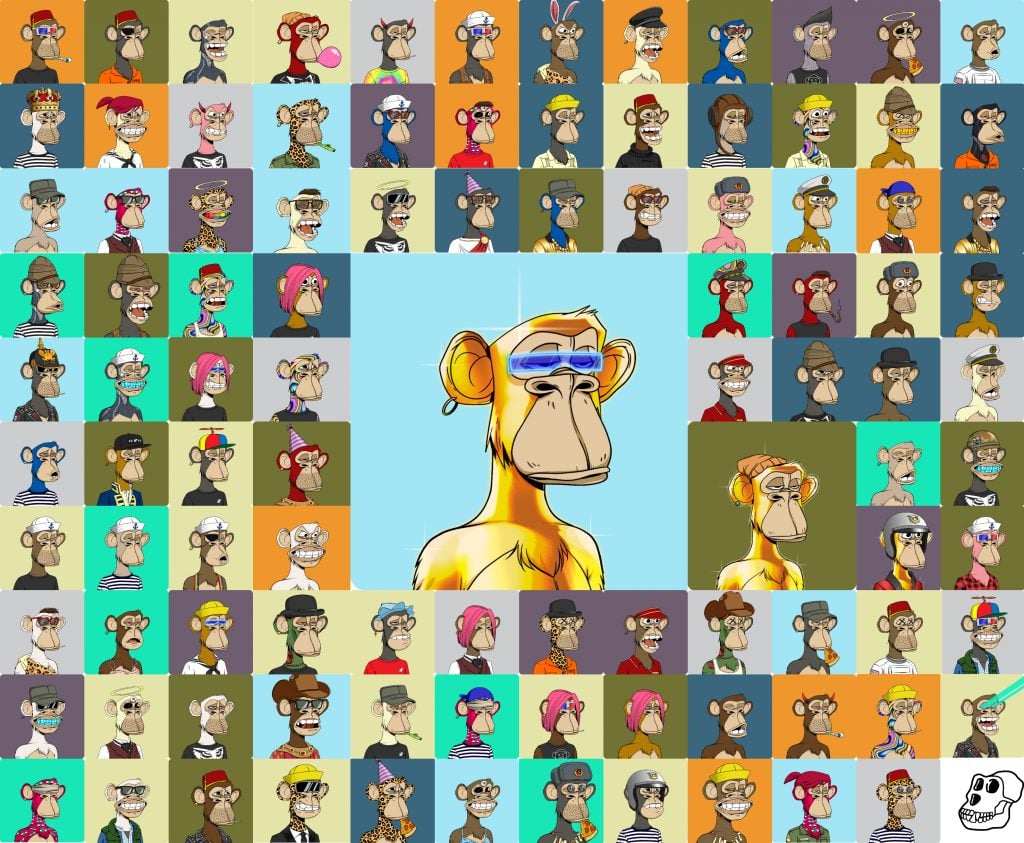
After a major acquisition, all eyes are on the BAYC.

The announcement set fire to the Twitterverse. On Friday, Yuga Labs—the Miami start-up behind Bored Ape Yacht Club, one of the hottest properties in the NFT world—revealed it would acquire CryptoPunks, perhaps the most lucrative crypto-art entity, as well as the popular Meebits collection.
One of the first major signs of consolidation in the NFT space, the deal brings three of the most valuable NFT projects under the same umbrella. Yet Yuga Labs took special care to reassure Bored Ape Yacht Club holders that their NFTs remain nothing less than the company’s crown jewel.
“We want to make it abundantly clear to Yuga’s existing community that the BAYC ecosystem will always stay at the center of our universe,” Nicole Muniz, Yuga Labs’s CEO, said in a statement.
That universe has proven lucrative. In less than a year, the cheapest Bored Ape NFT has climbed from $250 to $250,000. While the floor price dropped amid economic uncertainty prompted by the war in Ukraine, it climbed more than 30 percent within 48 hours of the CryptoPunks announcement, and BAYC trades spiked by more than 300 percent.

Jimmy Fallon and Paris Hilton discuss their love for NFTs. Courtesy of the Tonight Show.
How exactly did a nascent startup ride to the top of the NFT sphere on the back of a series of cartoon monkeys?
Muniz has an answer: culture. “Some people want to be part of the next innovative thing or experience—and some people are willing to pay for that,” she said in an interview with D3 Network.
Bored Ape Yacht Club is a collection of 10,000 unique NFTs, each with its own set of disinterested expressions, colors, and clothes. Like CryptoPunks, their value is designed to be based on scarcity. Among Bored Apes, some traits are rarer than others.
But Yuga Labs wants Bored Apes to offer something more: real-world utility, of some sort. Since the Bored Ape Yacht Club launched in April 2021, that utility has evolved into free money, parties, and, with its latest acquisition, the potential for an expanded NFT universe.
Real utility has been a raison d’être for tokens since the initial coin offering era of 2017. Over the past year, as NFTs have exploded in popularity, their creators have had to come up with their own vision for exactly how these assets could enrich the lives (and bank accounts) of their owners.
At this very moment, Bored Ape Yacht Club is devising its pitch to become the dominant player in the space.
When the Bored Apes launched, Yuga Labs gave its NFTs two initial forms of utility. For starters, everyone who owned an ape instantly acquired the I.P. to their avatar, which meant they could put images of their character on products. (By contrast, the copyright for CryptoPunks remained with their creator, Larva Labs. As part of the recent acquisition, Yuga Labs will transfer the CryptoPunks I.P. to their respective owners.)
Ape holders also got access to a virtual bathroom with a graffiti wall and the ability to change one pixel on the wall at a time. “This privilege refreshes every 15 minutes, so if you’re patient, you can slowly draw a dick,” Vulture wrote. (The Bored Apes website itself also explicitly states that a “wall full of dicks” is inevitable.)
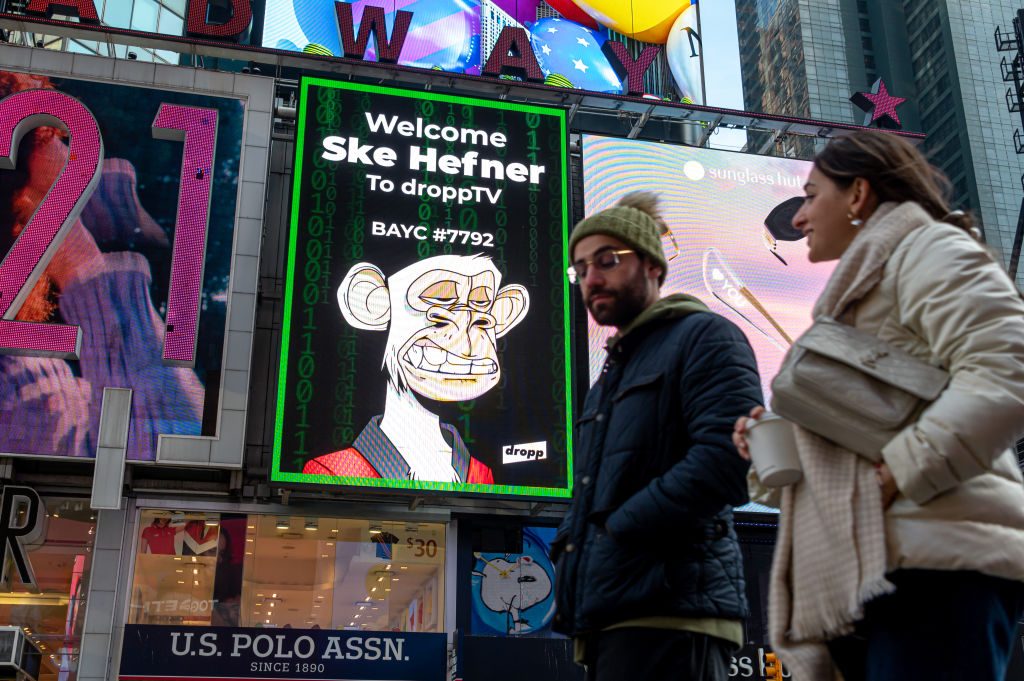
People walk by a Bored Ape Yacht Club NFT billboard in Times Square on January 25, 2022 in New York City. (Photo by Noam Galai/Getty Images)
“Nobody cared about the bathroom—that wasn’t the appeal,” Chris Chapman, who heads a construction business, told Artnet News. Chapman owned Bored Ape #511, a monkey in a spacesuit with red fur and eyes floating out of its head, before a bug on OpenSea forced him to sell it for the low price of 90 ETH ($230,000). Now, he’s trying to get the ape back. In the meantime, he co-owns another with friends.
The appeal, for him, was owning the rights to his cartoon gorilla.
“If you wanted to put your Bored Ape on top of your restaurant and advertise your restaurant as ‘Bored Ape Bar,’ you could do that,” he explained.
So far, nobody has opened a Bored Ape-themed bar or restaurant, but a brewery in Michigan released a Bored Ape IPA. Another holder licensed the use of his NFT to sell weed. And at least one has figured out how to use his avatar ownership to generate additional NFTs.
Yuga Labs’ main founders initially hid their identities, but were recently identified by Buzzfeed, who linked their names to public business records. They are Wylie Aronow and Greg Solano, two literary bros from Miami who bonded over heated discussions of David Foster Wallace and later borrowed money from their moms to hatch the project. (Yuga Labs did not reply to inquiries for this story.)
In less than a year, Bored Ape tokens have generated around $2.6 billion in sales, according to Nonfungible. Yuga Labs now has a team of 60 full-time employees, up from 11 in January. Last fall, the company signed a deal to be represented by Madonna’s manager, Guy Oseary.
Despite high-profile boosters like Stephen Curry, Gwyneth Paltrow, and Justin Bieber, the BAYC community remains relatively small: at press time, there were just 6,400 unique owners of Bored Apes, according to OpenSea.
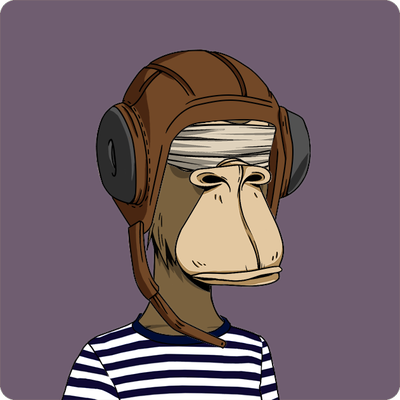
Gwyneth Paltrow’s Bored Ape. Courtesy of Twitter.
The founders’ goals, meanwhile, are lofty. “We want your Bored Ape to be your digital identity,” Solano told the New Yorker.
Crisp artwork makes the apes well suited to Twitter profile pics, or PFPs. (The images look heavily inspired by Jamie Hewlett, the artist who drew Tank Girl and co-created virtual band Gorillaz.)
Franklin Caldwell, a structural engineer, was on the lookout for a project to invest in when he noticed NFT influencers from NBA Top Shot change their Twitter profile pics to apes—a sign to him that Bored Apes were going to be big. He now owns 36.
“The fact that people changed their profile pictures so quickly. And so much in unison. It gave it a really strong community backing,” he told Artnet News.
Community is a compelling lure for many Bored Ape holders. If you are an investor interested in NFTs, Bored Apes are a mark of prestige and a way to showcase your success.
It is similar to paying thousands of dollars to join a golf club, explained Drew Austin, a technology investor who owns a Bored Ape (#8649) with bloodshot eyes, smoking a spliff. “You can go golfing anytime, but it is the membership—it is the community, feeling like you are part of something,” he said.
Some of the other dividends don’t hurt, either.
Over the summer, Yuga Labs spontaneously dropped more NFTs on Bored Ape holders to reward their loyalty. In June, it sent out free Bored Ape Kennel Club Dog NFTs to each holder and, a few months later, free “mutant serum” that generated a new Mutant Ape Yacht Club avatar.
“Of course, everybody loves the free money,” Chapman said.
The minimum price for a Bored Ape Kennel Club NFTs is now 8.25 ETH ($21,060). And the cheapest Mutant Ape Yacht Club NFT goes for 19.9 ETH ($50,800).
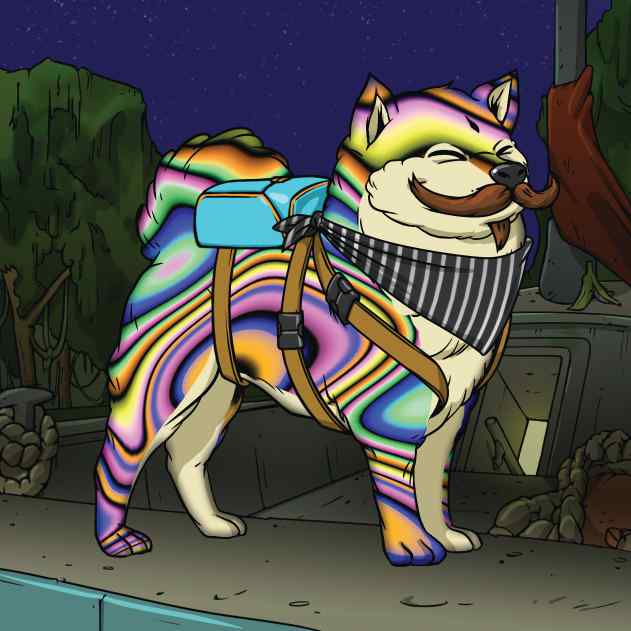
Yuga Labs, Bored Ape Kennel Club 5211
In addition to giving existing Bored Ape owners a “mutant serum” to mint a free Mutant Ape NFT, Yuga Labs also minted 10,000 new Mutant Ape NFTs and offered them to the general public for 3 ETH ($10,000). The entire batch sold out within an hour, netting Yuga Labs $96 million.
There are other perks, too: access to merchandise, private chat rooms on Discord, games that pit apes against mutant apes, and even boat parties.
Around Halloween, Bored Ape holders got to attend a giant shindig on a yacht in New York City and later, a warehouse event in Brooklyn where they took in performances by comedian Chris Rock and musicians the Strokes, Beck, and Lil Baby. It was all part of Apefest 2021. (And yes, there is an Apefest 2022 in the works.)
“It was pretty fun. A lot of us wore costumes representing our apes,” Chapman said. He donned a hoodie and sweatpants with pics of the apes he owned. Drinks were on the house.
When NFTs caught public attention in early 2021, they were touted as a way to safeguard artists and protect their work. (Ironically, the main artist behind the Bored Apes pics has gotten little recognition.)
Now, Yuga Labs—like many other NFT creators—is working to keep holders interested and engaged so they don’t sell everything and re-invest in a competing project. The acquisition of CryptoPunks was one way to do that. Increasingly, engagement also requires finding ways to bridge the gap between the digital and the real worlds.
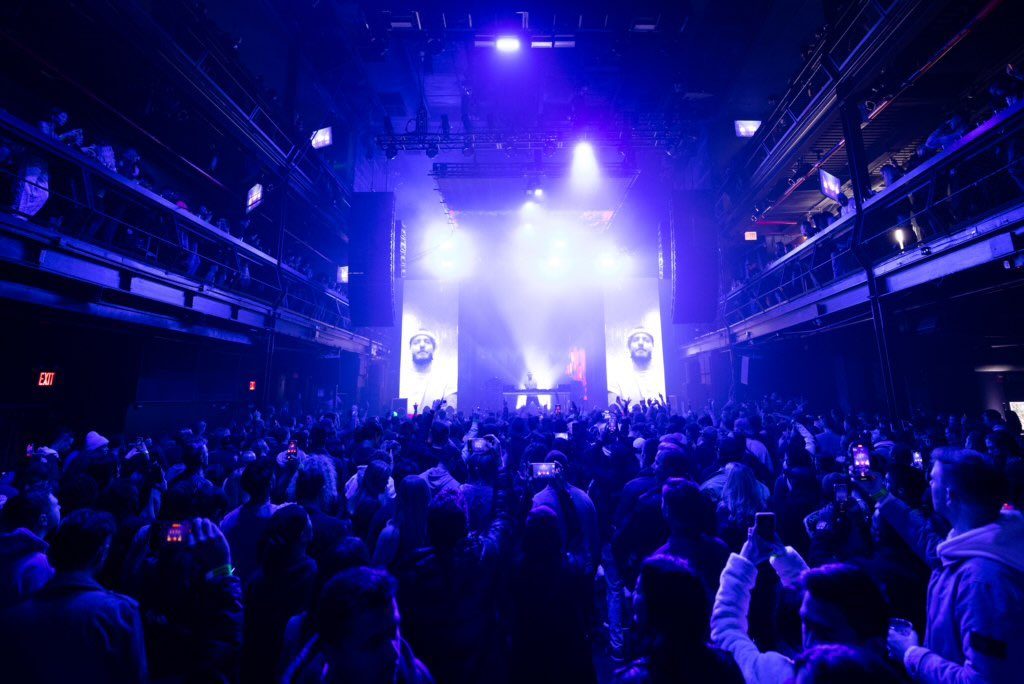
The party at the Dreamverse NFT event in NYC. Courtesy of Dreamverse and Metapurse.
“A lot of the drive for utility stems out of insecurity of what NFTs actually are,” Canadian YouTuber and NFT skeptic Dan Olson told Artnet News. Olson is the creator of a two-hour video on “the problem with NFTs” that went viral. It has over 6 million views to date.
After NFTs went mainstream, the initial criticism was that you could not buy exclusive access to the image; you were just getting a link to a JPEG. You could hang the image on your wall as a print, but so could everyone else, because they all have access to the same digital file.
A lack of utility has been a longstanding “sliver under the nail” complaint about NFTs, Olson said. It didn’t help that, before the news of the CryptoPunks acquisition buoyed sales, the floor price for a Bored Ape had fallen 44 percent since the war in Ukraine caused NFT values to tumble.
The future of Yuga Labs will hinge on the case they make for Bored Apes’ enduring relevance amid its expanding universe. A Roadmap 2.0, released on Twitter in September, offered a few hints about what’s in store.
Nothing was written out formally (and there was no mention of a CryptoPunks acquisition)—it was simply an annotated image of a swampy trail. (Roadmap 1.0, posted on the website, was similarly nondescript and consisted of a list of items like, “We pay back our moms.”)
The 2.0 map includes a Bored Ape and a Mutant Ape standing together above a caption that reads, “3D models.” Yuga Labs also wants Bored Ape holders to use their avatars in the metaverse and as VIP passes to a physical club in Miami.
In addition, the roadmap points to a Bored Ape Yacht Club DAO, or decentralized autonomous organization. DAOs are member-owned investor groups that live on a blockchain. Some, like the Andreessen Horowitz-backed PleasrDAO, have been buying up high-profile NFTs. DAOs are generally associated with a governance token; the more tokens one owns, the more say they have in the DAO’s decisions.
More recently, the company announced a mysterious new project in collaboration with Animoca Brands, a blockchain gaming company. (To sign up, Bored Ape holders are required to reveal their real-life identities, which has sparked anger among many in the community.)
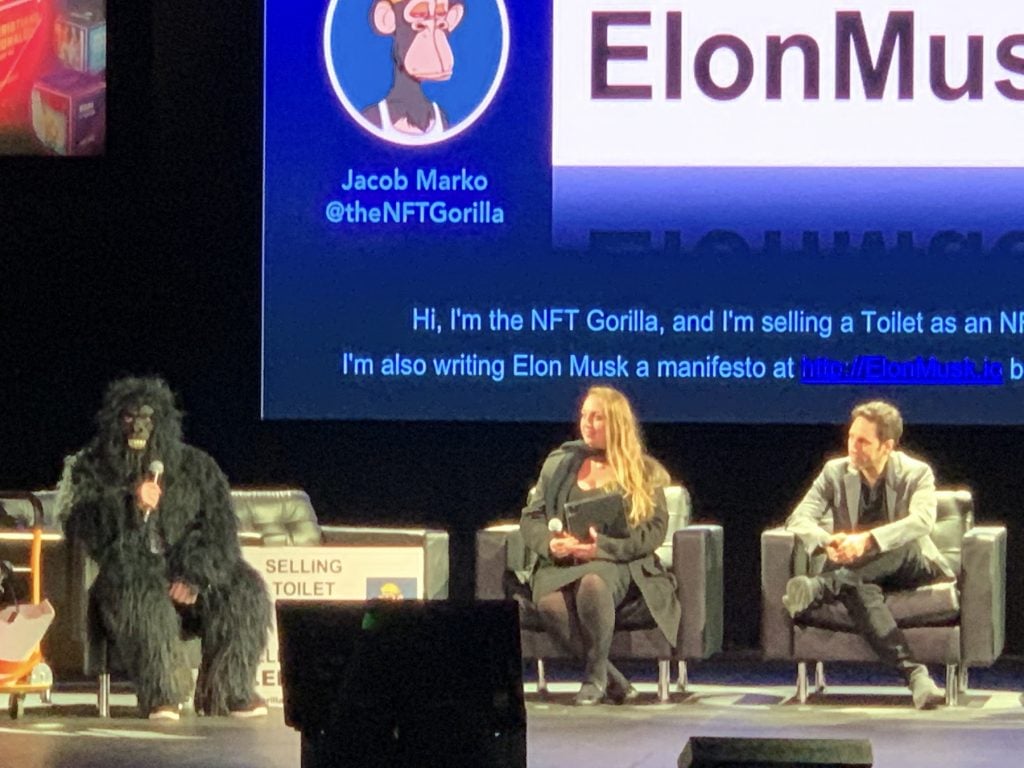
Jacob Marko, the NFT Gorilla, speaks at NFT.NYC. Photo by Ben Davis.
Whatever ideas it comes up with, Yuga Labs has enough capital to deliver on them, in some shape or form. Its founders made $2 million on the initial Bored Ape sales, and they get a 2.5 percent royalty on every future trade on OpenSea. While they won’t get royalties on future CryptoPunk or Meebits sales, they did acquire a hefty chunk of the characters—423 CryptoPunks and 1711 Meebits—as part of the deal with Larva Labs.
Plus, the acquisition of CryptoPunks and Meebits opens the door to creating new NFTs from the imagery, which could result in another meaningful payday. Andreessen Horowitz is also looking to potentially invest millions of dollars into the BAYC project, which could value it at $4 billion to $5 billion.
The big thing Bored Ape owners are holding out for—though, for some reason, it doesn’t appear on Roadmap 2.0—is a fungible token. BAYC has announced plans to launch an Ethereum-based cryptocurrency before the end of March.
The crypto doesn’t have an official name yet, but Bored Ape holders are calling it “APE coin.” They are hoping it will arrive in their wallets via some sort of airdrop—an impromptu distribution like the one that delivered their Kennel Dog and Mutant Ape NFTs.
An “APE coin” could serve as a prize for NFT holders or function as a governance token for BAYC’s upcoming DAO. The trick will be for Yuga Labs to release the coin in a manner that is legally compliant. They are working with law firm Fenwick & West LLP on how to do that. (Fenwick did not respond to a request for comment.)
Andreessen Horowitz is also a backer of Coinbase, the largest crypto exchange in the U.S., and has two directors on Coinbase’s board. It’s possible they could use their influence to get BAYC’s fungible token listed on the exchange, which would make it easily tradable.
Regardless, such a development will likely take a while to iron out. The acquisition of CryptoPunks and Meebits served to inject new energy into BAYC, buying them valuable time.
Bored Ape holders hope that, whenever it happens, APE coin makes them rich.
“Hopefully, it makes me more wealthy, so I don’t have to sell my apes,” Caldwell said. “I can just sell what they airdrop me and I can keep my apes, and make some income.”